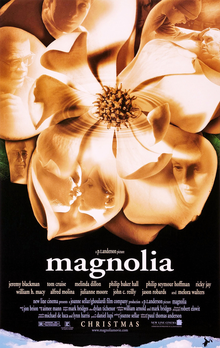 |
| Cooper Hoffman and Alana Haim in Licorice Pizza |
Cast: Alana Haim, Cooper Hoffman, Sean Penn, Tom Waits, Bradley Cooper, Benny Safdie, Skyler Gisondo, Maary Elizabeth Ellis, John Michael Higgins, Christine Ebersole, Harriet Sansom Harris, Ryan Heffington, Nate Mann, Joseph Cross. Screenplay: Paul Thomas Anderson. Cinematography: Paul Thomas Anderson, Michael Bauman. Production design: Florencia Martin. Film editing: Andy Jurgensen. Music: Jonny Greenwood.
Ever seen a movie that you liked but a couple of years later couldn't remember a thing about it? That's what Licorice Pizza was for me. Which is odd, because one of the things about Paul Thomas Anderson's movies is that they're so memorable, if only for certain moments, like the rain of frogs in Magnolia (1999) or Daniel Day-Lewis threatening to drink Paul Dano's milkshake in There Will Blood (2007). But there's something comparatively low-key about Licorice Pizza, at least for the first half of the film. It's basically a boy-meets-girl story, or rather a boy-meets-woman story: A more-than-usually assertive 15-year-old boy meets a slacker twenty-something woman. Teenager Gary Valentine (Cooper Hoffman) is an actor and an entrepreneur; Alana Kane (Alana Haim), who is either 25 or 28, depending on which you believe of the ages she gives at one point in the movie, lives at home with her parents and her sisters (played by Haim's real-life family). Gary and Alana meet when he's standing in line to have his high school yearbook photo taken; she's an assistant to the photographer, a job she dislikes. They begin a relationship that turns co-dependent and evolves into an off-beat (and possibly illegal) romance. And for a time that's all there is, until after the excursions of the two into the waterbed and pinball machine business put them in contact with some big name Hollywood types: Sean Penn plays a very thinly disguised version of William Holden, and Bradley Cooper a very broadly caricatured Jon Peters. These extended cameos throw the film out of whack for a while until the main story gets its balance back, though it ends with a sequence that's a cliché out of the romcom genre. I think one of the reasons Licorice Pizza is so unmemorable is that Anderson hasn't quite figured out how to turn the autobiographical elements of his story, drawn from growing up as an actor's son in the San Fernando Valley, into a narrative that connects with the audience. It had the same effect on me as Steven Spielberg's The Fabelmans (2022), another film that doesn't rise out of autobiography into common experience. Both movies were fun to watch but they didn't quite stick with me.




